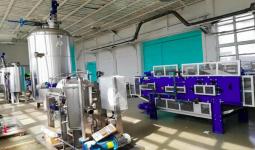
Caprolactam made of socks – on the road to the circular economy
Valuable raw material produced from chemical waste – pilot plant opened in Slovenia
As part of the EU-funded RESYNTEX project, a new pilot plant was opened in Maribor, using textile waste. The plant was presented to the general public on the open day of May 23, 2019.
Most of the waste from the collection of used textiles or from industrial processing takes place in landfills and / or is disposed of (incinerated). A number of researches are aimed at obtaining secondary raw material from textile waste. A successful solution is presented by the new investment of the Resyntex project, which provides a valuable monomer by depolymerization and decolorization of textile waste (cotton, cotton / polyester, polyamide 6, polyamide 6.6 and polyester).
Initial experiments allowed recyclability on a laboratory scale. In the Slovenian experimental plant, it was unique in the world to produce high purity monomer from textile waste under operating conditions. The technological development of chemical degradation and decolorization was realized by the consortium partners of the project. The experimental plant line, high temperature and high pressure tanks and chemical feeders were developed by an Italian machinery manufacturer. The technology in the closed system of the experimental plant equipped with the wastewater treatment plant can produce liquid caprolactam from shredded textile waste. Thus, socks or scraps of socks can be either a new raw material for the plastic or paint industry, or a discarded cotton t-shirt or cellulose pulp from jeans is a valuable raw material for viscose and lyocell production - creating the foundations of a circular economy.
With the spread of the technology presented on the open day and the utilization of waste of such, the environmental demand and the oil demand for synthetic fiber production can be significantly reduced in the future. The monomer in other industries (chemical industry, furniture industry, cosmetics, etc.), it can also be used for bioethanol as wood binder – for example. However, there are areas where monomeric polymer from waste cannot be used, even in the case of their high purity. Such is the food industry, where packaging that is directly in contact with food is subject to stringent regulatory requirements. The presentation said that the technology is primarily applicable to sorted waste, but it is also successful in textile waste consisting of cotton / polyester blends. Elastane content is no problem if it is less than 10%.
There is a great deal of interest worldwide in the chemical processing of waste. The open day attracted interested professionals from many countries of Europe. Companies such as Lenzing and Sympatex were present, but also Scandinavian, Croatian, French, English, etc. companies and designers dealing with waste processing or use.
At the Open Day, Lívia Kokas Palicska PhD, CEO and Mária Magdolna Márton, Chemical Engineer participated as representatives of INNOVATEXT Co. The Company’s ENTeR research project is about textile waste, so the institute itself is interested in promoting the circular economy. The event also provided an excellent opportunity for networking, so professionals in the networking program agreed on how Resyntex and ENTeR project patrons can work together in the future. Within the framework of the collaboration, Resyntex researchers will be invited to the ENTeR project in Slovenia this year.
After the open day, experts from INNOVATEXT visited their colleagues at Maribor Technical University. The purpose of the meeting with Professor Snježana Firšt Rogale, and Jelka Gersak PhD and at the Department, was to prepare the Croatian textile forum to be held in 2020 as part of the ENTeR project. The Croatian event could be organized linked to the textile days of the Technical University of Zagreb which is usually held in January every year. In connection with the organization of the event, the ENTeR project consortium leader and INNOVATEXT project coordinator will immediately contact the Croatian colleagues.
/Photo Credit: https://twitter.com/RESYNTEX/


